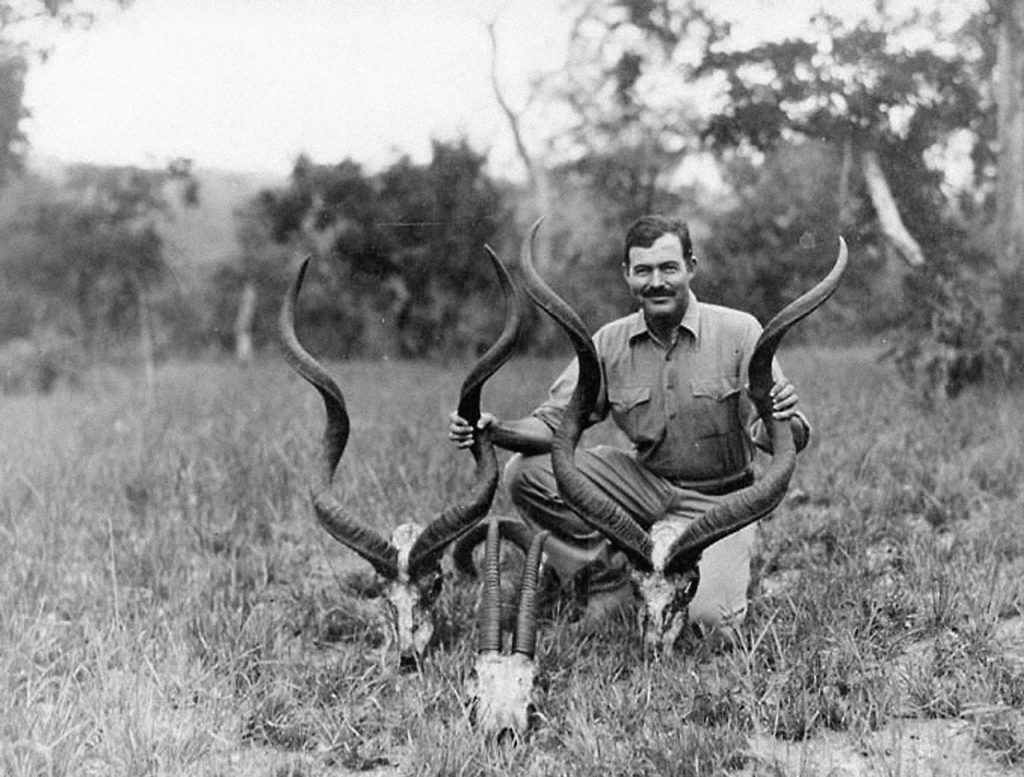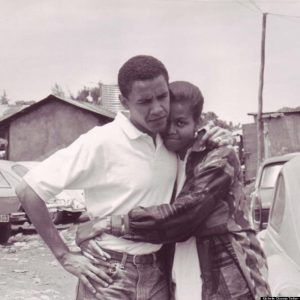Ernest Miller Hemingway, world-renowned American author and journalist, lived his life to the fullest. From a young age, Hemingway traveled around the globe as a journalist, soldier, and as a resident. Serving in both World Wars and influencing foreign conflicts by doing things like reporting on the Spanish Civil War, he experienced a great variety of cultures and people. As an author, his work had great literary merit, earning a Nobel Prize in Literature and the Pulitzer Prize for one of his later novels, The Old Man and the Sea.1.

Apart from composing literary masterpieces, Hemingway indulged in a multitude of activities, especially in different outdoor ventures. His two biggest passions were fishing off the coasts of Florida and Cuba and big-game hunting.2 In particular, he went hunting with one of his wives for months at a time. Hemingway’s life outside of writing was extremely busy, though his expeditions were often what brought his fictional stories to life.
Hemingway grew up going on hunting trips in and around Michigan with his father, and later he often traveled to foreign countries to hunt big game. One of his expeditions to Africa inspired the short story, The Short Happy Life of Francis Macomber. Taking place in a safari, the narrator Macomber, accompanied by his wife, faces the underlying consequences for showing fear as a hunter.3 Hemingway was a chaser—one who pursued his passions and values above regardless of their consequences. If Hemingway was interested in something, he would dive into it for large portions of his life.
In December of 1954, Hemingway and his wife Mary spent their holiday in an African safari, traveling by plane to the Congo. Unfortunately, while on a flight, their pilot collided with a telephone pole while they were flying at a low altitude. This crash injured the three people on board, and rendered them of minor to medium levels of injury. The entire party required medical assistance, stranded in the wilderness. The group opted to wait out the night, all while being surrounded by elephants who resided near the crash site.4
The next morning after being returned to camp by locals, Hemingway was prepared for takeoff to a local hospital for treatment of his injuries, along with his wife. Just as liftoff began, the plane suddenly was engulfed in flames, trapping the Hemingways and the pilot in a fireball. Barely escaping with their lives, all of the people on board were critically injured, with Hemingway suffering burns and even leaking cerebral fluids. After surviving two consecutive plane accidents, Hemingway took months to recover, spending most of that time restricted to a hospital bed. And with great luck, Hemingway was able to read the headlines that mistakenly reported his death after the crash; the man who knew the face of death dearly once again cheated an untimely fate.5

Hemingway was a man of grit who saw injuries barely restricting his wants. Only a couple months after the two accidents, Hemingway, more injured than his wife, went on and subsequently had trouble traversing on a fishing trip. Almost as quickly as the trip started, it ended in another tragic incident. Caught in a bush fire, Hemingway was burned all over his body, second-degree burns spread across his arms and face.6. Amazingly, and not surprisingly, Hemingway escaped the event without any major injuries. However, the series of catastrophes eventually led to his extended abuse of alcohol, a factor of his later life from which he would not escape free from damage.7 .
The next year, Hemingway was bedridden, constantly sick from a weakened immune system from a series of illnesses, including pneumonia. Eventually, in 1960, Hemingway checked into the Mayo Clinic in Minnesota to seek medical help. Oddly enough, his visitations to the clinic were mostly kept secret, and the FBI helped keep the incident classified.8 In the end in 1961, Hemingway was released from the clinic worse than when he entered. After an apparent suicide attempt, Hemingway was sent to the Sun Valley hospital until late June.9.

In the early morning of July the 2nd, Hemingway committed suicide in his Idaho home, at 61 years old.10 For him, a major downward spiral began after the plane crashed in the Congo. In a somber sense, Hemingway’s existence would have merely continued his depression and discontent if he had not committed suicide. Without knowing the life of Ernest Hemingway, readers would never fully understand the significance of his works. All authors write literary works for personal reasons, and the reason authors are so passionate about their work lies in their own backgrounds. As for Hemingway, his works symbolized the attrition he felt while working several roles he played in his life.
People may think Hemingway’s life reeked of bad luck, as a lot of his adult life was either marked by injury or a call to action on the battlefield. To Ernest Hemingway, this pain was fuel for his pen. Despite his unfortunate demise, his life was not wasted. Hemingway was not a coward for his actions. It could be argued that his exposure to the world and the connections he had to political conflicts caused his choice to take his life. In his later life, he was heavily surveyed by the CIA. He sensed their presence and felt quite skeptical. As with many literary figures, whose fame rises after their life has passed on, Hemingway’s greatest fame came after his death. For Hemingway, it always came easy to see what was worth living, and he wrote these words to share with the world.
- Linda Wagner-Martin, Ernest Hemingway: A Literary Life (New York: Palgrave Macmillan, 2007) 10-13 ↵
- Verna Kale, Ernest Hemingway (London: Reaktion Books, 2016). 30-32 ↵
- Linda Wagner-Martin, Ernest Hemingway: A Literary Life (New York: Palgrave Macmillan, 2007) 40-44. ↵
- Mary V. Dearborn, Ernest Hemingway: A Biography (New York: Knopf, 2017) 45-47 ↵
- Linda Wagner-Martin, Ernest Hemingway: A Literary Life (New York: Palgrave Macmillan, 2007), 90-94 ↵
- James M. Hutchisson, Ernest Hemingway: A New Life (University Park, Pennsylvania: The Pennsylvania State University Press, 2016) 148-152 ↵
- James M. Hutchisson, Ernest Hemingway: A New Life (University Park, Pennsylvania: The Pennsylvania State University Press, 2016) 219-223 ↵
- Verna Kale, Ernest Hemingway (London: Reaktion Books, 2016), 150-155 ↵
- Linda Wagner-Martin, Ernest Hemingway: A Literary Life (New York: Palgrave Macmillan, 2007) 183-187 ↵
- James M. Hutchisson, Ernest Hemingway: A New Life (University Park, Pennsylvania: The Pennsylvania State University Press, 2016) 246-447 ↵



35 comments
Victoria Davis
Ernest Hemingway is a very persistent and demonstrated a lot of strength throughout the article. Who would have known that the same individual would survive two back to back plane crashes, then would get caught on fire by another accident. He would survive all of this and still continue to live his life strongly. It was such a great article to read with so much inspiration.
Juan Arceo
This article delivered in showing the strength and the tenacity the Ernest Hemingway. How many people have you heard about that have survived back to back plane crashes, accidents, and sickness and just live to tell the tale? Even though he unfortunately committed suicide, his strength to live should be viewed by everybody as a reminder that we shouldn’t let actions stop us and we should continue to move forward.
Sydney Hardeman
This article was fascinating to read. It was interesting reading about Ernest Hemingway and his story. To survive two back to back plane crashes, followed by another tragic accident in which he gets caught on fire, and to keep living as if nothing happened, shows how strong Ernest Hemingway was. He persevered and lived through the worst, and kept fighting. Truly inspiring.
Mia Correa
Ernest Hemingway. What a man. He lived such an eventful life with near death experiences which is more than a lot of people can say they’ve had. But the fact that he was strong enough to live through all of this and keep fighting until he just couldn’t fight anymore is something that I think a lot of people could learn from. I also think this article was very informative with a great storyboard and I would definitely recommend this article to anyone and everyone!
Vania Gonzalez
Hemingway was a great author and his works were amazing but I had no idea how much tragedy he went through in his life. That crash led his life to be sad and after living crazy adventures it must have been so hard for him. His experiences in life led to some of the greatest works in literature although it was a tragedy and it led to his eventual suicide which is a big problem in society that still needs to be brought into more awareness. Great article I really enjoyed this one.
Mitchell Yocham
A lot of people see unfortunate events as horrible and bad luck but Ernest saw these events as an opportunity to succeed in his writing. Many people in his position would even give up and just end their lives, but he stood strong and saw the happy things in life. Hemingway defied the laws of life and survived despite always having bad luck, people should be more resilient like him and look at the brighter things of life.
Isabella Torres
After continuously getting in these life threatening accidents, all of them basically back to back, Hemingway must have felt like a magnet for bad luck. I can’t imagine surviving not just one plane crash, but two of them along with the fishing accident that followed. It’s very saddening that Hemingway felt his only option was suicide in the end. However, his writings were very influential and he spent the majority of his life doing what he was passionate about.
Jacob Silva
I’ve never known much about Ernest Hemingway other than that he’s a celebrated writer and author, one of the greats in literature. The other thing I heard about him was that he was paranoid that he was being monitored by some government agency, which according to this article was true. What this article does is that it humanizes Hemingway in a sense that you can feel and understand the struggles that he endured which unfortunately claimed his life by his own hand.
Jose Chaman
Ernest Hemingway is undoubtedly one of the most intrepid and dedicated writers. Not everyone can live as many adventures as he did, adventures that were seeds for his excellent works. For that reason, his suicide was somewhat unheard of and very sad. I agree that suicide is not justifiable action in the face of depression. His magnificent works are still the reflection of what he was before succumbing to the depression.
Nicholas Robitille
Hemingway truly was a quite unfortunate soul. In a series of events, Hemingway consecutively survived not one or two, but three horrible accidents that left him with separate injuries. He lived through these horrific accidents just to contract pneumonia. Honestly, Hemingway’s ability to be a recognized literary figure while surviving these tragedies makes him a writer quite hard to surpass. It is truly a shame that Hemingway saw fit to end his own life after surviving so many of these events, but he shall ever continue to be a great literary figure.